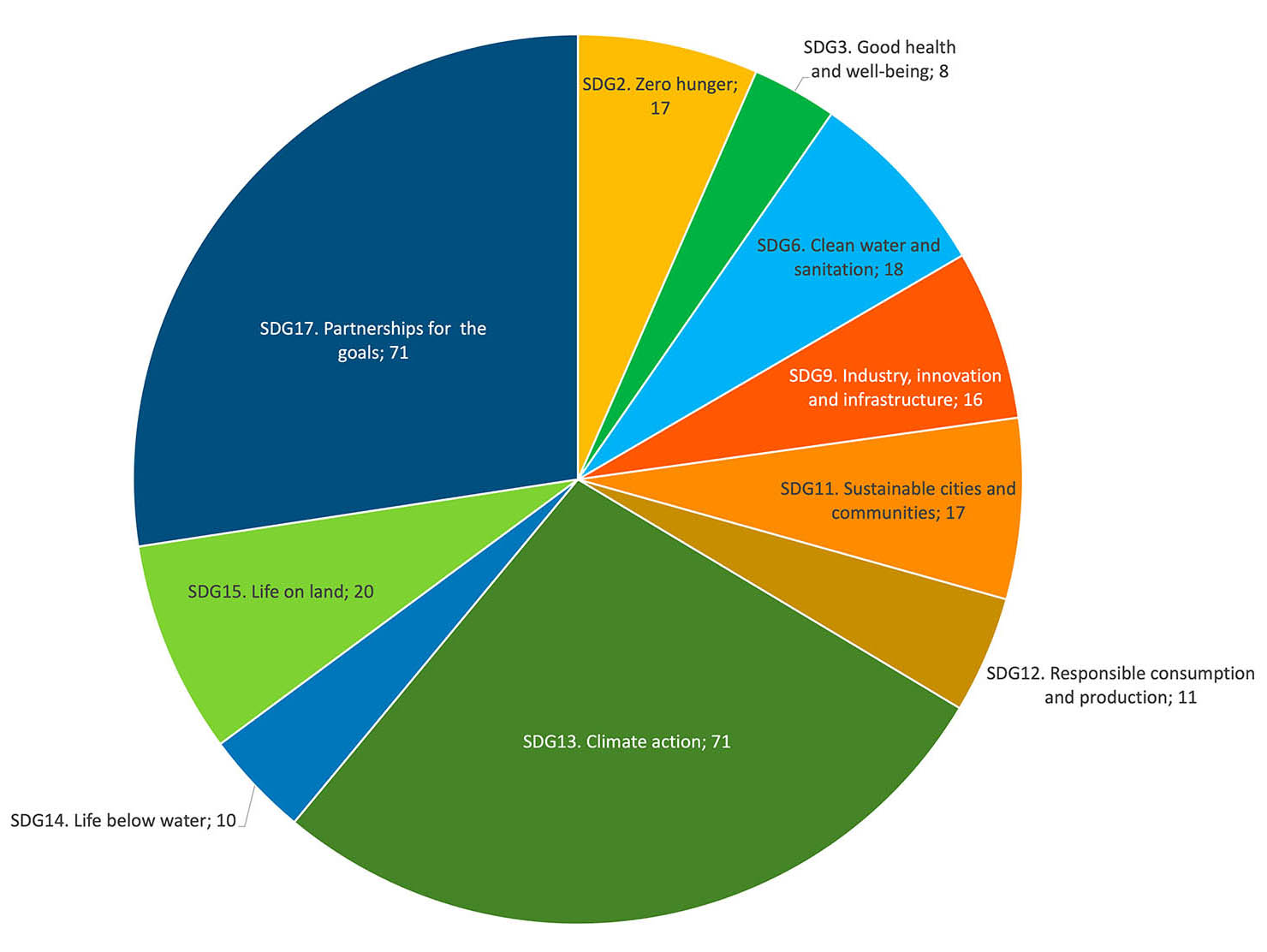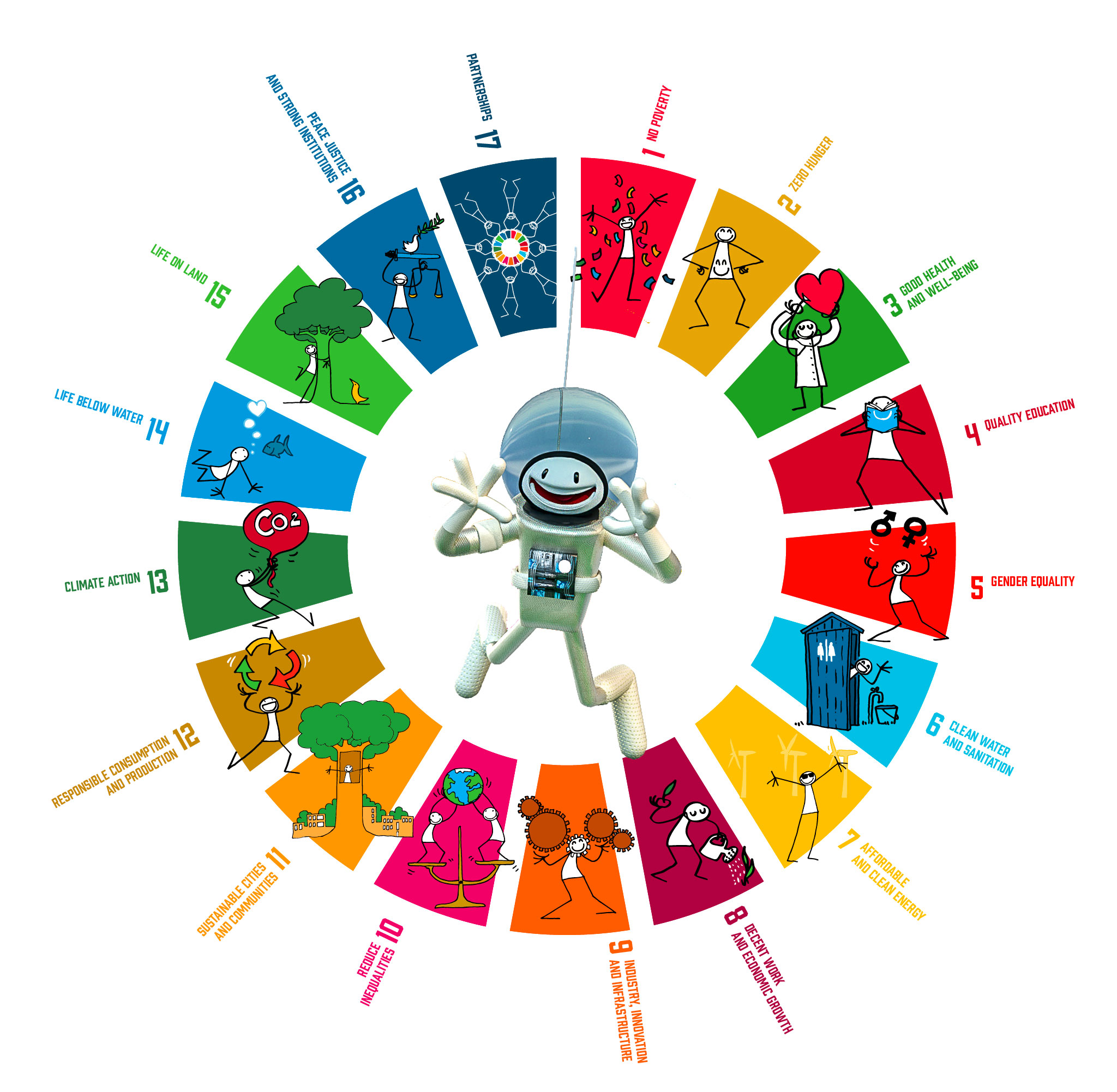Halfway to the 2030 Agenda
Published on
25/09/2023
The Sustainable Development Goals (SDGs) are a global call to action to protect the planet and promote peace and prosperity for all. On 25 September 2023, the mid-term anniversary of the 2030 Agenda, the SCO joins the UN and its partners in supporting the achievement of this ambitious and necessary programme.
In 2022, the SCO asked ELYX, the United Nations' digital ambassador, to talk about the SDGs. ELYX then donned an astronaut's outfit to support the contribution of space to achieving the SDGs. © ELYX/CNES
Let's remember: on 25 September 2015, 193 countries adopted the Sustainable Development Programme or Agenda 2030 at the UN, which defines 17 Sustainable Development Goals (SDGs) that must be achieved by 2030 to eradicate poverty, protect the planet and ensure prosperity for all. These 17 SDGs reflect the values we need to adopt, or rediscover, in order to live prosperously in harmony with our environment. In town and country alike, respect, sharing and solidarity are the key words.
Created in line with the 2030 Agenda and the Paris Climate Agreement, the SCO is part of this dynamic and its projects are direct contributions to its implementation. Each of the links below invites you to take a closer look at the SCO's responses to the various SDGs mentioned.
100% of SCO projects are in line with SDGs 13 & 17
If the SCO is about harnessing the full potential of satellite data, SDGs 13 and 17 alone sum up the foundations of the SCO:
- The SCO's raison d'être : SDG13, "Take urgent action to combat climate change and its impacts" 👉Resilience to floods and extreme events, monitoring of coastal zones and their vulnerability to marine submersion, forest fire prevention, flood warning systems, etc. Working alongside local authorities, the SCO approves local projects to accelerate the development of operational solutions (maximum 24 months) to combat or adapt to the impacts of climate change.
|
- Its modus operandi: SDG17, "Revitalize the global partnership for sustainable development" 👉 Each SCO project is steered by a consortium that brings together all the necessary skills around the end user: scientists, public bodies, local elected representatives, the private sector, associations, etc. As the SCO is an international network, solutions developed locally are pooled to be transposed elsewhere in the world.
|
4 other priority SDGs in the SCO: SDGs 2, 6, 11, 15
As the impacts of climate change affect all activities and all environments, SCO projects are working in particular to promote the following SDGs:
- SDG2, "Eradicate hunger, ensure food security, improve nutrition and promote sustainable agriculture" 👉 Several SCO projects contribute to this SDG, by supporting the transition of rural areas, facilitating crop monitoring and improving their resilience to extreme events, or anticipating agricultural drought episodes.
- SDG6, "Ensure access to water and sanitation for all and ensure sustainable management of water resources" 👉 From global monitoring of the load on dams to monitoring the quality of small water reservoirs and optimized management of water resources, including soil moisture, many SCO projects address this major challenge for the future.
- SDG11, "Sustainable Cities and Communities" 👉 With 55% of the world's population already living in urban areas, and soon more, cities are the focus of people, problems and solutions related to climate change. The SCO attaches particular importance to this issue, with a range of tools to help inform urban planning choices, particularly with regard to heat islands, heat leakage and atmospheric pollution.
- SDG15 "Preserve and restore terrestrial ecosystems" 👉 The Earth is our only ship in the Universe. Many SCO projects are committed to preserving the nature without which we cannot live: by monitoring global tropical deforestation, restoring wetlands, monitoring changes in natural habitats, protecting migration corridors, promoting nature-based solutions...
|
Support for the most vulnerable, a cross-cutting issue
Just as the Sustainable Development Programme advocates social justice, the SCO's Charter sets out the governance and operation of the organization to support the most vulnerable countries to the impacts of climate change. For example, some of the projects accredited by SCO France are taking place in Haiti (Gade Lapli), Vietnam (Vimesco-Rice and Viet-ARRO) or in the Bengal Delta (Band-SOS) to develop, with local players, the decision-making tools or warning systems they need, and even to train them so that they can fully appropriate the tool in question.
|

The 10 main SDGs addressed by the SCO and the number of projects responding to them out of a total of 71 projects. © SCO
Education, the foundation
Finally, there is another absolutely crucial issue for the future: education. While the UN has dedicated an SDG (number 4) to education because "education promotes socio-economic mobility and is a means of escaping poverty", the SCO in France has assigned it a project: EducSCO. To make young people aware of the challenges of climate change, and to inspire them to take part in tomorrow's solutions, EducSCO supports teachers through training courses and provides them with a growing range of teaching tools.




